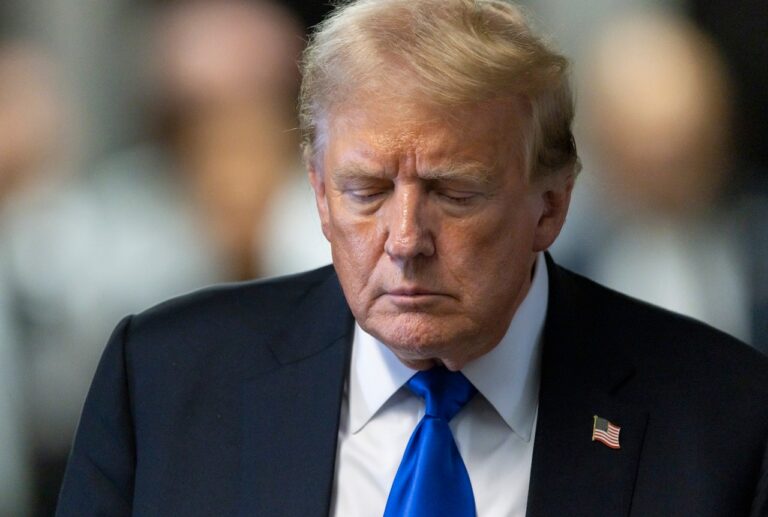What sentence could former President Donald J. Trump face?
it is of Big questions now arise after Trump, a presumed 2024 Republican presidential nominee, was convicted of 34 felony counts of falsifying business records to quash rumors of an affair during the campaign.
Now, an hour after the verdict, experts appear divided on whether Trump should serve any prison time.
But they largely agree that getting into prison and actually being in prison are two very different things.
Few expect Trump to serve his hush money sentence before voters decide his political future in November, because Judge Juan M. Marchan is likely to release him on bail until the completion of his appeals, which are expected to last until 2025.
As of now, Trump’s sentencing is tentatively scheduled for July 11.
This will come after the completion of a pre-sentence investigation and a process in which the prosecution and defence will each make recommendations regarding appropriate punishment for Marchan, but the final decision rests with the judge.
Manhattan District Attorney Alvin Bragg, speaking at a press conference Thursday night, would not immediately say whether he would ask the judge for a prison sentence, instead saying his team would make that statement in court documents, according to CBS News.
While in Pennsylvania, judges must start with sentencing guidelines designed to fit the specifics of the case before them, including points based on the defendant’s criminal history and the seriousness of the crime, and then clearly explain any increases or decreases from those guidelines, judges in New York have a bit more discretion at the start of a trial.
The maximum statutory sentence for falsifying business records in New York State is one and a half to four years in prison, but Judge Marchan can also impose a sentence of up to one year in prison or a range of non-incarceration sentences, from probation to community service and fines.
Some doubt that Trump will ever go to prison.
“I don’t think there will be any prison time. I would be very surprised if that happened,” Fordham University Law Professor Cheryl Bader said Thursday.
Bader said that was based in part on the circumstances of Trump’s particular case.
She noted that he had no prior felony convictions and that the charge of falsifying business records is classified as a Class E felony in New York state, the least serious felony.
Then there’s the fact that Trump is 77 years old.
Not to mention the logistical difficulties of incarcerating a former president who is entitled to Secret Service protection.
Bader said the only uncertainty is the idea that Judge Marchan is somehow trying to hold Trump to a higher standard because he’s a former president, but she said that’s out of character for the way the judge has handled cases so far — it seems like he’s making an extra effort to keep the case running as normal.
“I think the judge exercised a very good judgment, within normal criminal procedures and processes, despite the intense scrutiny and pressure he was under,” she said.
Trump was convicted of 34 counts of falsifying business records in connection with concealing a $130,000 hush money paid to porn star Stormy Daniels in the days before the 2016 election.
Data from New York state shows that while incarceration for business records offenses is uncommon, it is not uncommon.
Of the 48 cases statewide in which business records counts were the primary reason for a felony or misdemeanor conviction in 2022, only 15 people ended up in jail or prison, or less than one in three, according to the New York State Department of Criminal Justice (2022 is the last year for which data is available).
Of two convictions that year in New York City for felony and misdemeanor counts of falsifying business records, neither defendant received any new prison time at the time of their sentencing.
In all other cases, defendants received time served, meaning they were not ordered to serve any more time than they had already served since their arrest, but that doesn’t apply in Trump’s case, and he will not receive probation, fines or any other type of release.
In 2021, of 71 such defendants statewide, only 19 received prison sentences.
But every case is different, and one legal expert speaking to CNN on Thursday offered a different take on Trump’s fate.
Karen Friedman Anifilo, a former top deputy in the Manhattan district attorney’s office, said several specific aspects of the case give reason to believe Trump may fall into the minority of cases where people go to prison for minor felony convictions.
- He has three criminal cases pending in three other jurisdictions.
- It may be difficult for him to express regret.
- He has already been fined 10 times by Marchand in this case for violating specific gag orders.
Agnifilo said that taking these factors into account, the average defendant “would certainly fall into the 10 to 30 percent of defendants who get a prison sentence. And his name is Donald Trump, so who knows what’s going to happen.”
“But those are the very factors that any judge in New York state would consider.”

